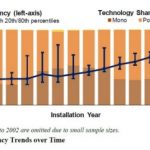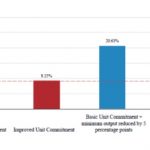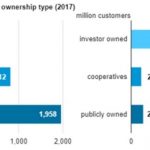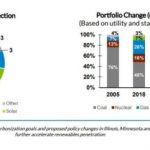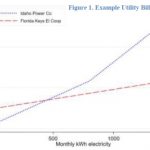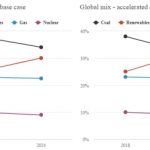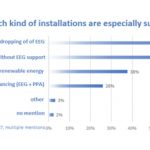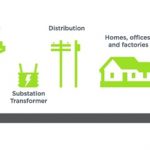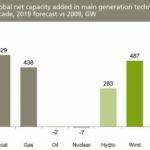In the U.S., PV module efficiency (median values) rose from 12.7% in 2002 to 18.4% in 2018, much of it in the last decade and a full percentage-point increase in the last year alone. The best modules are even more efficient, says John Rogers at the Union of Concerned Scientists. Improvements have come from manufacturing processes and cell architectures, and the increasing share of more-efficient mono-crystalline technologies: up from 40% in 2016 … [Read more...]
Better grid integration beats coal plant ramping to reduce wind, solar curtailment
Wind and solar curtailment is worst where these renewables are poorly integrated into the grid. The further their energy can reach the more regions they can service, thus minimising curtailment. If they don’t reach far, local coal plants must ramp down - but only if they’ve been retrofitted to be able to do so. It’s a problem faced by many countries: spend money on the retrofits or the integration? Writing for the Regulatory Assistance Project … [Read more...]
California fires and blackouts: would non-profit utilities be more reliable, safer, cheaper?
The wildfires in California ignited by poorly maintained transmission lines have themselves ignited a debate about whether the guilty - and now bankrupt - energy utility PG&E (the largest in the state) should now become publicly owned. That in turn has led Severin Borenstein at the Energy Institute at Haas to consider the pros and cons of public v private in this vital activity. The first thing to note is that electricity transmission and … [Read more...]
Rolls Royce wants innovative financing for its first-of-a-kind nuclear SMRs
Rolls Royce has made nuclear reactors for decades, small enough to fit inside nuclear submarines. It’s now adapting that expertise for the grid. Dan Yurman runs through the details of the firm's plans, including a look at its first-of-a-kind 440MW technology. Regulatory timescales will be kept short by developing the small modular reactors (SMRs) at existing licensed nuclear sites – with Cumbria and Wales its main targets. Importantly, an … [Read more...]
Midwest U.S. grid operator MISO: modelling for a clean energy future
Planning can’t be easy for a grid operator. Take MISO which operates one of the world’s largest energy markets. They’re responsible for integration and bulk transmission across the central U.S., but decisions on the actual future energy mix and demand are being made elsewhere: by state governments, utilities and consumers big and small. Given the amounts invested in infrastructure and the lead times involved, no one will thank MISO if their … [Read more...]
Electricity pricing: shifting costs on to households that can afford it
Utilities need to invest in the future, and the Transition needs to be paid for by their customers. The less painful that is to each customer, the more publicly acceptable it will be. Maximilian Auffhammer at the Energy Institute at Haas explains how electricity pricing usually combines a fixed monthly charge with a block rate price (the charge for each additional unit of energy). Here he reviews a new report that scrutinises how different firms … [Read more...]
An independent Global Energy Forecast to 2050 (part 4 of 5): Nuclear, biomass and CCS
Schalk Cloete is creating his own 5-part independent Global Energy Forecast to 2050, to compare with the next IEA World Energy Outlook, due in November. To make his predictions he has created simulations of cost-optimal technology mixes and made his own assumptions over the drivers that will affect them: policy, technological progress, demand growth and behavioural change are all included. If nuclear, biomass and CCS take off they will … [Read more...]
Creating a market to trade excess wind/solar between states (without outsourcing your emissions!)
How do you get neighbouring states, with different renewables mixes, and different emissions targets and penalties, to trade their surplus energy? It’s one of the biggest challenges to face the rapid growth of intermittent wind and solar. Meredith Fowlie at the Energy Institute at Haas describes how an “Energy Imbalance Market” (EIM) is operating across eight states in the west of the U.S. Bidding for your neighbour’s excess renewable energy is … [Read more...]
Why renewables need gas: case study USA
Everyone is predicting the continued expansion of gas through to 2050. Jim Conca reviews the state of play in the U.S. to explain why that projection makes sense. The welcome and rapid growth of renewables still needs something to provide backup load-following to a growing and increasingly intermittent electric grid. Gas is the cheapest to roll out and can keep prices low for decades. The other two contenders, hydro and nuclear, just can’t match … [Read more...]
1.2TW: cost reductions, policy advances will drive 50% renewables growth to 2024, says IEA
Carbon Brief’s Simon Evans runs through their analysis of the updated forecasts in the International Energy Agency (IEA) Renewables 2019 report, released this week. In its “base case” global renewable energy capacity will increase by 50% over 6 years. Rising from 2,501GW in 2018 to 3,721GW in 2024, it will add the equivalent of the entire US electricity system. In the “accelerated case” it’s 60%, further adding the equivalent of Japan’s. 85% of … [Read more...]
Germany 2021: when fixed feed-in tariffs end, how will renewables fare?
Starting in 2021 many of Germany’s existing “pioneer” wind turbines, solar PV installations and biogas plants – launched with generous price guarantees - will stop receiving fixed feed-in tariffs. That means renewable capacity may be shut down if they can’t find a new business model to run on. The new rules comes at a decisive time for Germany’s energy transition as it tries to increase renewables to meet emissions targets and gradually increase … [Read more...]
An independent Global Energy Forecast to 2050 (part 3 of 5): fossil fuels
Schalk Cloete is creating his own 5-part independent Global Energy Forecast to 2050, to compare with the next IEA World Energy Outlook, due in November. To make his predictions he has created simulations of cost-optimal technology mixes and made his own assumptions over the drivers that will affect them: policy, technology, demand growth and behavioural change are all included. Cloete reminds us that fossil fuels did not reach their dominant … [Read more...]
Non-Wires Alternatives for grid expansion: what the U.S. can teach Europe
Grid expansion usually means more power stations and wires. Far from simple, and very expensive. Non-Wires Alternatives (NWA) solve the problem differently by reducing net demand. Modern methods of energy efficiency, demand response, storage, and distributed generation are coordinated and used instead, under the banner of Distributed Energy Resources (DER). Crucially, it can cast utility firms in the role of market makers, not just generators and … [Read more...]
Calculating the effect of $50/tonne CO2 on energy prices
Despite much debate, governments are hesitant to raise – or even impose – carbon pricing, worried about the direct impact it will have on businesses and consumers.To help understand its effect Severin Borenstein at the Energy Institute at Haas has crunched the numbers of a $50/tonne CO2 price, very expensive by today’s standards. He’s calculated the actual price increases on a gallon of petrol/gasoline, gas- and coal-fired generation, and natural … [Read more...]
2018 investment in renewables 12% down on 2017
At $272.9bn, 2018 investment in renewables capacity was 12% down on the previous year. Despite this, renewables’ investment was three times the total for coal and gas-fired generation capacity combined in 2018. Over the last decade, $2.6tn was invested in renewables (half going to solar), quadrupling capacity to 1,650GW. Consequently, renewables’ share of electricity generation reached 12.9%, up from 11.6% in 2017. This avoided an estimated 2bn … [Read more...]
- « Previous Page
- 1
- …
- 12
- 13
- 14
- 15
- 16
- 17
- Next Page »


